EXTENSION OF REGISTRATION DEADLINE
Due to technical problems on the platform that led to a delay on the start of registrations, the registration deadline (Art. 10 and 17 of the DR 2024 notice of 25.2.2025) is extended to 4 p.m. on 12.4.2025.
RANKING LIST - FOURTH ADMISSION TEST - 28.03.2025
The candidates can register starting at 4 p.m. on tuesday 1 april 2025 and mandatorily by 4 p.m. on monday 7 april 2025.
The matriculation process is considered finalized with full payment of the first installment of tuition, registration fees, regional fee and stamp duty.
MODALITY OF IMPLEMENTATION OF THE ADMISSION TEST
The admission test for the Healthcare Professions Courses for the academic year 2024/2025, provided for in the call issued by R.D. n. 2024, will take place on 28.3.2025. The candidates are convocated at 10.00 a.m. and the test will begin at ore 10.30 a.m.
BRANCH:
-
For candidates who have chosen to take the test at the Rome branch:
Link Campus University, via del Casale di San Pio V, 44 (near Piazza di Villa Carpegna) Ancient Library
(Free parking is available on site) -
For candidates who have chosen to take the test at the Città di Castello branch:
Link Campus University, via Carlo Marx, 20 – Classroom 1
(Free parking is available on site)
For the academic year 2024-2025, enrolment in the Degree courses in the healthcare professions with programmed access, listed in the table below, is subject to passing an admission test.
| n. | Class | Course | Branch |
Places EU |
Places extra EU |
|---|---|---|---|---|---|
| L05 | L/SNT1 | Nursing (qualifying for the healthcare profession of Nurse)* | Città di Castello – ASL n. 1 Umbria | 90 | 10 |
| L06 | L/SNT2 | Physiotherapy (qualifying for the healthcare profession of Physiotherapist)* | Città di Castello – ASL n. 1 Umbria | 65 | 10 |
| L07 | L/SNT4 | Osteopathy (qualifying for the healthcare profession of Osteopath)* | Rome Ospedale San Pietro via Cassia | 65 | 10 |
| L08 | L/SNT4 | Osteopathy (qualifying for the healthcare profession of Osteopath)* | Città di Castello – ASL n. 1 Umbria | 65 | 10 |
The admission test for the degree courses in the healthcare professions is identical for access to all the types of courses activated at the same university and during the test the candidate must proceed to enter, on the personal data sheet, the choice of courses and the relative location, in order of preference, up to a maximum of 4 options, one of which is compulsory.
The choice of at least one degree course is compulsory, if the candidate does not make any choice they will be excluded from the evaluation and consequently from any ranking list.
In the event of any of these scenarios occurring, the University will issue a special notice to make the remaining places available to candidates who have taken the test at other universities and were unable to matriculate due to a shortage of places.
*Territorial tax incentives
The University provides for important territorial tax incentives for students enroled in courses at the Città di Castello branch of the University and resident in:
- Città di Castello: 30% discount on the tuition fee
- province of Perugia and Arezzo: 20% discount on the tuition fee
- regions of Umbria, Tuscany and Marche: 10% discount on the tuition fee
Admission test date
The admission test will be held on 28/03/2025 at both the Rome and Città di Castello (PG) branches of Link Campus University.
The locations for the admission test will be determined on the basis of the number of applications received and may also be located outside the venues of the university.
The time when candidates will be convened the locations of the test will be published by 24/03/2025.
Submission of the application for the admission test
Registration for the admission test must be carried out within 4 p.m. on 28/2/2025 and must be completed by 4 p.m. on 24 March 2025, along with the payment of the test fee.
During the registration phase, in addition to entering all the data required by the procedure, the candidate must specify the location chosen for the test, provide consent to the processing of personal data and acknowledge having read the present Call.
Test topics and admission criteria
The candidate must proceed to enter, on the personal data sheet, the choice of courses and their location, in order of preference, up to a maximum of 4 options, one of which is compulsory.
The admission test consists of a written multiple-choice test presenting five answer options, from which the candidate must identify only one, discarding any incorrect, arbitrary or less likely conclusions. It consists in 60 questions in Italian on the basis of the syllabuses provided for in Attachment A and distributed as follows:
- 4 questions of reading skills and knowledge acquired throughout the studies
- 5 questions of logical reasoning and problems
- 23 questions of biology
- 15 questions of chemistry
- 13 questions in physics and mathematics
The admission test will last 100 minutes.
Ranking and publication of results and procedure for managing takeovers
By 1 April 2025, the general merit list will be published anonymously using the candidate's pre-registration number, as well as the individual course rankings, also anonymously.
After publication, the boxes of the biographical data sheets will be opened in public session to allow the candidate code and biographical data to be matched.
For applicants from non-EU countries living abroad, an autonomous general ranking list and autonomous individual course rankings are established by the University.
Candidates placed in a useful position in the individual course rankings are admitted to the course and may therefore proceed with the enrolment.
The deadline for registration is 4 p.m. on 7 April 2025.
Each candidate will be included in all rankings for the chosen courses.
The candidates may only enrol in the course for which they are eligible; if they are eligible for more than one ranking list, they may only enrol in the course for which they have expressed the highest order of preference.
Candidates who do not register by 4 p.m. on 7 April 2025 will be considered withdrawn.
Enrolment requirements
Enrolment is finalised upon payment in full of the first instalment of the tuition fee, registration fee, regional tax and stamp duty.
Failure to complete enrolment by the deadline referred to in the previous article shall entail the renunciation of enrolment and shall result in the rankings being reversed.
Summary table of deadlines and privacy notice
| Activity | date | See Article Notice |
|---|---|---|
| Registration application |
From 4.00 p.m. on 28.2.2025 to 4.00 p.m. on 24.3.2025 |
Article 4 |
| Publication of candidate convocation time and test location | 24.3.2025 | Article 3 |
| Implementation of the admission test | 28.3.2025 | Article 3 |
| Publication of the ranking list | Within 1.4.2025 | Article 10 |
| Deadline for matriculation candidates | Ore 16 del 7.4.20255 | Article 10 |
| Publication 1° take-over | Entro 9.4.2025 | Article 10 |
| Request for change of course to better choice | Within 12.00 on 12.4.2025 | Article 10 |
| Payment of any tuition fee | Within 12.00 on 12.4.2025 | Article 10 |
| Deadline for registration of first take-over candidates | Within 12.00 on 12.4.2025 | Article 10 |
| Payment of the 2nd instalment | 7.05.2025 | Article 11 |
| Payment of the 3rd instalment | 9.06.2025 | Article 11 |
| Payment of the 4th instalment | 8.07.2025 | Article 11 |
The Bachelor's Degree in Nursing is part of the Degree Courses in Health Professions and aims to train operators who carry out, with professional autonomy, activities aimed at preventing, treating and safeguarding individual and collective health, performing the functions identified by the relevant professional profile, as well as by the specific Code of Ethics.
The duration of the course is three years and attendance is compulsory. The acquisition of skills by students is calculated in terms of Credits (CFU): 60 for each year of the course for a total of 180.
The learning pathway includes: frontal didactic activities, didactic activities chosen by the student, professional training activities (internship), individual study and other individual training activities. The Bachelor's Degree in Nursing combines theoretical knowledge with practical training in various care facilities, with the aim of training higly competente professional figures, able to face and perform a fundamental service to the person and the community.
The Bachelor's Degree in Nursing is a three-year course and qualifies graduates to practise the profession. Admission to the course is subject to programmed access governed by an admission notice.
The aim of the course is to train health professionals who carry out activities aimed at prevention, treatment, rehabilitation, palliation and safeguarding individual and collective health with professional autonomy.
The professional profile of the nurse participates in the identification of the health needs of the person and the community, formulates the relevant objectives, plans, manages and evaluates the nursing care intervention; ensures the correct application of diagnostic-therapeutic prescriptions; acts both individually and in cooperation with other health and social workers.
The attainment of professional skills is implemented through theoretical-practical training, which includes the acquisition of behavioural skills, achieved in the specific work context, so as to guarantee, at the end of the training course, the full mastery of all the necessary skills and their immediate employability in the work environment.
CAREER OPPORTUNITIES
The graduates in Nursing will be able to find employment in public or private health and social care facilities, either as employees or freelancers. In particular, the candidates may aspire to work:
- in hospitals in all in-patient units and out-patient services;
- in hospital and territorial emergency services;
- in post-acute, long-stay facilities, assisted healthcare residences, rehabilitation centres, care centres for the disabled, hospices;
- in territorial, home and outpatient health services;
- in prevention and public health services.
![]() Download the Educational Offer Nursing (L/SNT1) - a.y. 2024/2025 (Città di Castello Branch) - a.y. 2024/2025
Download the Educational Offer Nursing (L/SNT1) - a.y. 2024/2025 (Città di Castello Branch) - a.y. 2024/2025
Learning Pathway - Nursing (L/SNT1) (Città di Castello Branch)
First Year
|
Subject |
CFU |
SSD |
|
1st Semester |
||
|
Morphological and functional bases of the cell Biochemistry Biology Applied physics Medical genetics |
2 1 1 1 |
BIO/10 BIO/13 FIS/07 MED/03 |
|
Fundamentals of health and safety in care settings Epidemiology General and applied hygiene General and clinical microbiology Health promotion and safety in care settings Health and Safety in the Workplace |
1 2 1 1 1 |
MED/42 MED/42 MED/07 MED/45 MED/44 |
|
Fundamentals of nursing science Nursing ethics General Nursing Science Theory of nursing |
1 3 2 |
MED/45 MED/45 MED/45 |
|
Morphological and functional fundamentals of the organism Human anatomy Physiology and food science Histology |
3 3 1 |
BIO/16 BIO/09 BIO/17 |
|
2nd Semester |
||
|
Basic pathophysiological mechanisms and the main organs and apparatuses Clinical biochemistry Immunology General pathophysiology Clinical pathology General pathology |
1 1 1 1 2 |
BIO/12 MED/04 MED/04 MED/05 MED/04 |
|
Methodological and clinical nursing processes Clinical nursing Nursing Methodology and EBN |
3 3 |
MED/45 MED/45 |
|
Social and psychological processes of the individual Social anthropology Nursing of educational and relational processes Clinical Methodology General Pedagogy General Psychology History of medicine |
1 1 1 1 1 1 |
M-DEA/01 MED/45 MED/09 M-PED/01 M-PSI/01 MED/02 |
|
For knowledge of at least one foreign language |
4 |
|
|
Internship I |
13 |
|
Second Year
|
1st Semester |
||
|
Nursing of diagnostic, therapeutic and rehabilitation processes Pathological anatomy Diagnostic imaging and radiation protection General pharmacology Clinical Immunology Clinical nursing applied to diagnostic and therapeutic pathways Nursing and rehabilitation sciences |
1 1 1 1 2 1 |
MED/08 MED/36 BIO/14 MED/09 MED/45 MED/48 |
|
Nursing - therapeutic and nursing processes in the medical area Endocrinology Clinical nursing in the medical area Diseases of the cardiovascular system Diseases of the digestive system Diseases of the respiratory system Diseases of the kidney and urinary tract Infectious diseases Oncohaematological diseases Internal medicine and geriatrics |
1 1 1 1 1 1 1 1 1 |
MED/13 MED/45 MED/11 MED/12 MED/10 MED/14 MED/17 MED/06 MED/09 |
|
2nd Semester |
||
|
Nursing in therapeutic and care processes in the surgical area General surgery Thoracic surgery Clinical nursing in the surgical area Orthopaedics/Traumatologists Urology |
1 1 1 2 1 |
MED/18 MED/21 MED/45 MED/33 MED/24 |
|
Nursing of therapeutic and care processes in the area of physical and mental disabilities Clinical nursing of patients with disabilities Clinical nursing in psychiatry and mental health Clinical nursing in palliative and end-of-life care Rehabilitation medicine Neurology Psychiatry Clinical psychology/em> Pain therapy |
1 1 1 1 1 1 1 1 |
MED/45 MED/45 MED/45 MED/34 MED/26 MED/25 M-PSI/08 MED/41 |
|
Nursing of therapeutic and care processes in the maternal area Clinical nursing in the maternal area Child Nueropsychiatry Obstetrics and gynaecology Paediatrics and neonatology Developmental and educational psychology SObstetrical and gynaecological nursing sciences |
2 1 1 1 1 1 |
MED/45 MED/39 MED/40 MED/38 M-PSI/04 MED/47 |
|
Annual Activities |
||
|
Internship II |
23 |
|
Third Year
|
1st Semester |
||
|
Nursing of therapeutic and care processes in the critical area Emergency surgery Pharmacology Clinical nursing in critical care and emergencies Emergency Medicine Resuscitation |
1 1 2 1 1 |
MED/18 BIO/14 MED/45 MED/09 MED/41 |
|
Evidence-based nursing methodology Evidence nursing Nursing research methodology Information processing systems Statistics of experimental and technological research Medical statistics |
1 2 1 1 1 |
MED/45 MED/45 ING-INF/05 SECS-S/02 MED/01 |
|
2nd Semester |
||
|
Legal and management principles applied to the nursing organisation Labour Law Elements of health management and economics Elements of health management and economics Legal Medicine Organization of care processes |
1 1 1 1 1 |
IUS/07 MED/42 IUS/09 MED/43 MED/45 |
|
Annual Activities |
||
|
ADE |
6 |
|
|
Seminars |
6 |
|
|
Professional Workshops |
3 |
|
|
Internship III |
24 |
|
|
Final Dissertation |
5 |
|
ADMINISTRATION OFFICES
STUDENT ADMINISTRATION OFFICE
Email: sanitarie.segreteria@unilink.it
Tel: +39 06 3400 6000
TEACHING OFFICE
Palazzina Romagnoli - 1st Floor
Office Hours
Monday - Wednesday - Friday: 10.00 - 13.00
Tuesday - Thursday: 14.30 - 16.30
Email: segreteria.docenti@unilink.it
Tel: +39 06 3400 6000
ADMISSION REQUIREMENTS
In order to be admitted to the Bachelor's Degree in Nursing, the student must have attained a high school diploma or other qualification obtained abroad that is recognized as eligible.
The Bachelor's Degree in Nursing is nationally programmed in accordance with Art. 1 of Law 264/1999, referred to by the provisions on nationwide programming issued annually by the Ministry of University and Research (MUR) and stated in the notices of competition.
In order to be admitted to the degree program, the candidates must pass an admission test that certifies the possession of adequate initial preparation in accordance with the provisions of current regulations regarding access to courses with programmed numbers at the national level. The admission test has a selective function and is organized by the faculty on the basis of provisions issued annually by the MUR.
The modalities and duration of the test are set out in the Ministerial Decree, which also defines the syllabus, content and modality of implementation of the test.
The students admitted to the bachelor's degree with a grade lower than a predetermined minimum grade, established each year by the class council and stated in the announcement, must fulfill additional educational requirements in the subjects of biology, chemistry and physics within the first year.
FINAL DISSERTATION
The final dissertation, discussed before a Commission appointed by the competent academic authority and composed in accordance with the law, includes:
- a practical test, in which the student must demonstrate the ability to handle a professional situation;
- the preparation and presentation of a paper on an assigned topic written under the guidance of a Supervisor.
The two graduation sessions are normally set in the period March-April and October-November by decree of the Ministry, University and Research in agreement with the Ministry of Labour, Health and Social Policies.
All the educational activities provided in the three years of the degree course syllabus, including elective activities and internship, contribute to the definition of the final mark. Computer Laboratory, knowledge of the English language and seminar activities are excluded.
The curricular average in thirtieths is calculated as a weighted average of the CFUs of the examinations taken and recorded with a mark in 110ths. The curricular average in 110ths is calculated by multiplying the curricular average in thirtieths by 11 and dividing it by 3. The average in 110ths will be rounded to the nearest whole number. To this value the Degree Committee may add up to a further 11 points, averaged over the following two parameters:
- a maximum 11 points for the practical test
- a maximum of 11 points for dissertation and presentation of ‘research’ dissertations and a maximum of 6 points for compilation-type dissertations; a dissertation is considered a research dissertation when it uses analyses consistent with the chosen study design (statistical analysis for quantitative data and text analysis for qualitative data) to develop its results.
Honours may be awarded by unanimous decision of the committee provided that the student has obtained 110/110 and has at least two honours in their curriculum vitae.
The modality of implementation of the final examination and its timing are defined in the academic calendar, published on the University website and communicated by the Student Administration Office.
For further information, please consult the following link: https://www.unilink.it/en/students/final-dissertation
GUIDELINES FOR THE ACCESS TO THE ADMISSION PROCEDURE
FIRST PHASE: REGISTRATION TO THE PORTAL
![]() Guidelines - Registration to the Portal
Guidelines - Registration to the Portal
STEP 1 - Click on the "Register" button at the top right.

STEP 2 - Click on the "Web Registration" button.
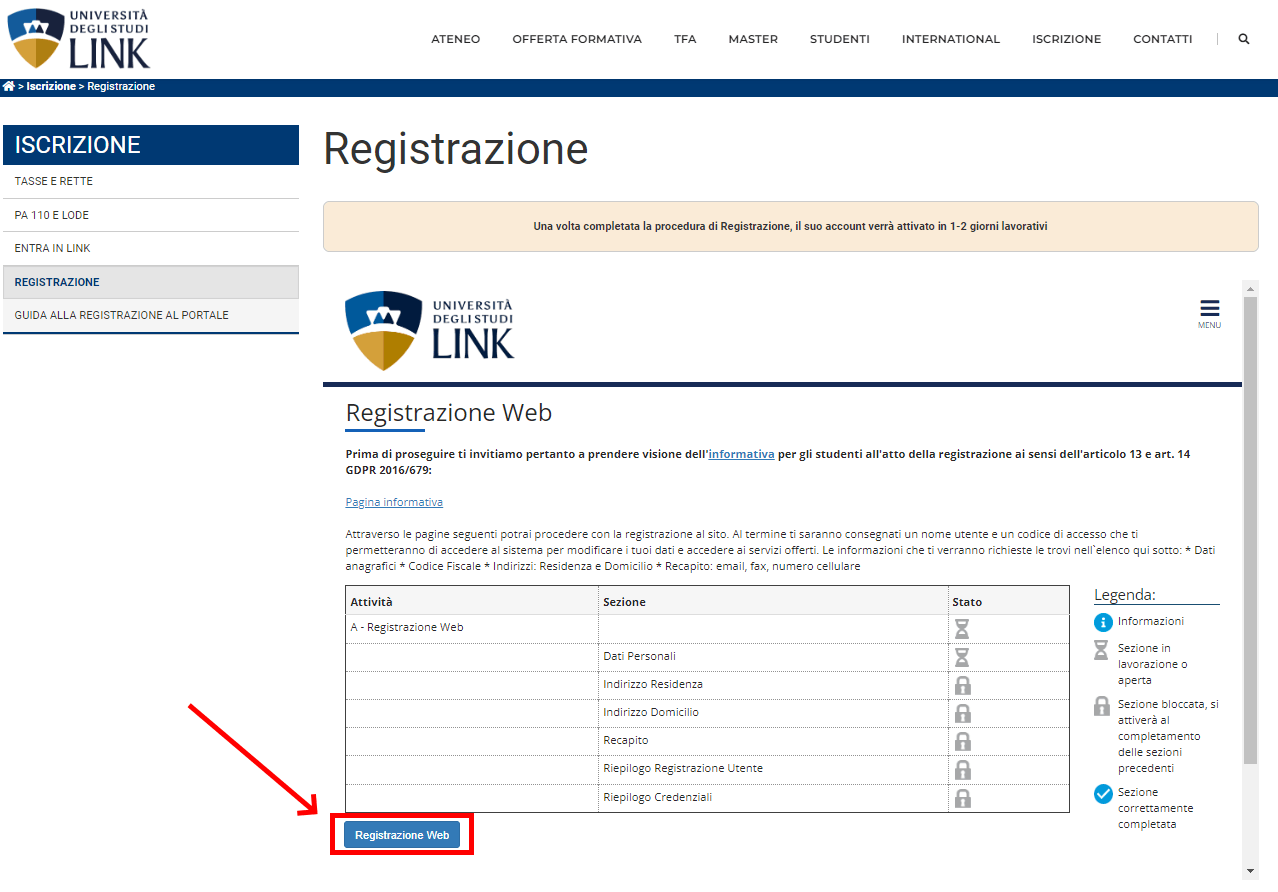
STEP 3 - Fill in the module in its entirety, then click on the "Next" button.
ATTENTION: please verify your tax code, because in case of error the user cannot be registered correctly.
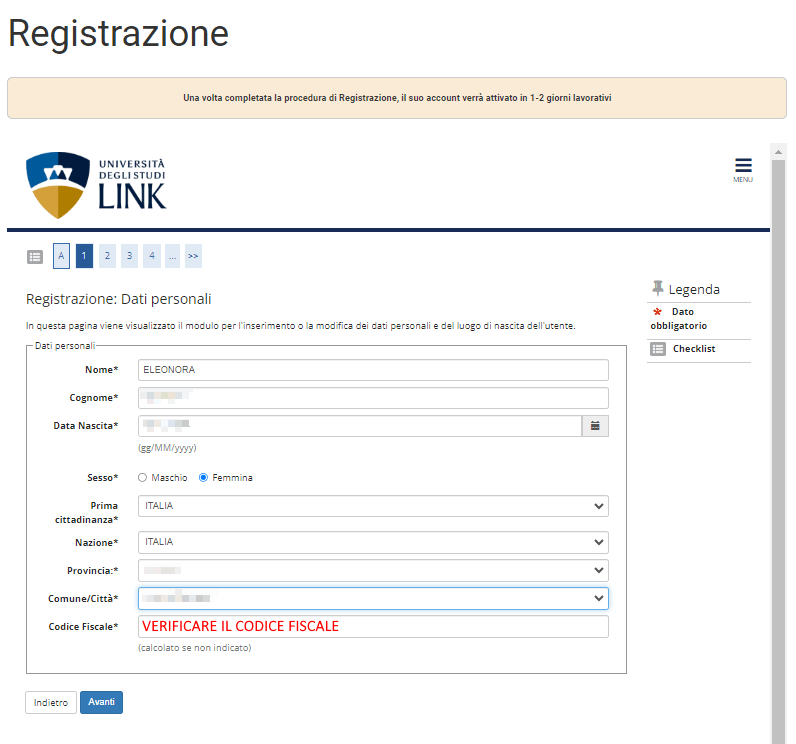
STEP 4 - Fill in the following form with the address of residence as stated in the title of the present section, then click on the "Next" button.
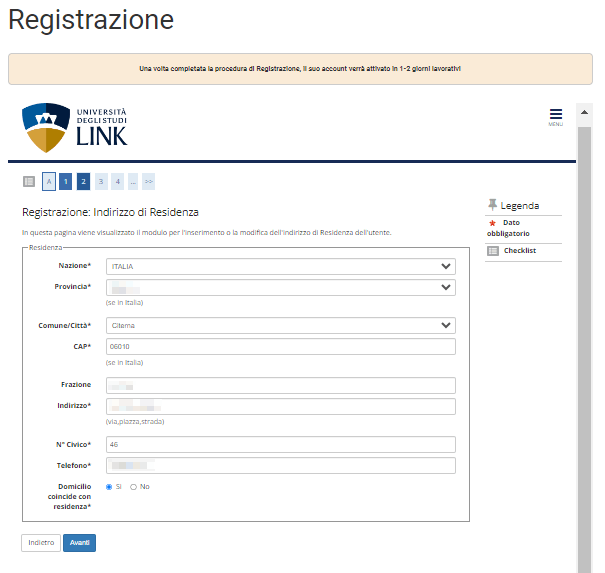
STEP 5 - Fill in the form related to the contact details only on the fields marked with an asterisk, in the "international prefix" field if you are in Italy, use 0039 as shown in the figure. Then click on the "Next" button.
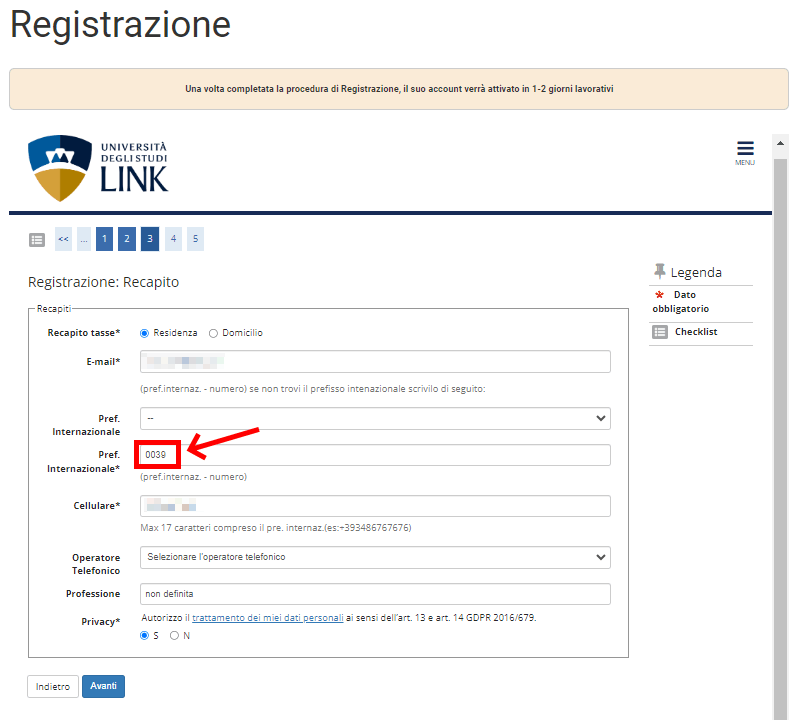
STEP 6 - You will now visualize the summary screen. Verify the correctness of the data and click on the "Confirm" button.
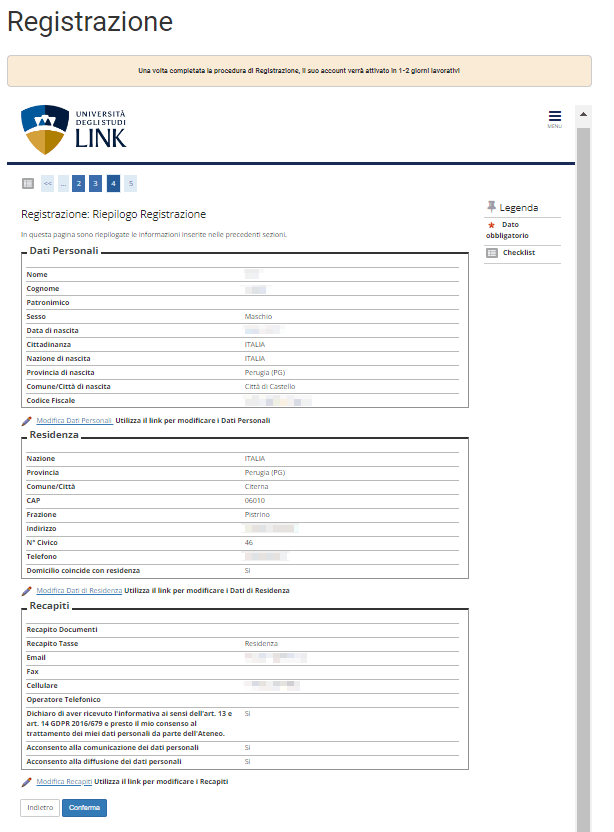
STEP 7 - At the end of the registration process you will receive the login credentials.
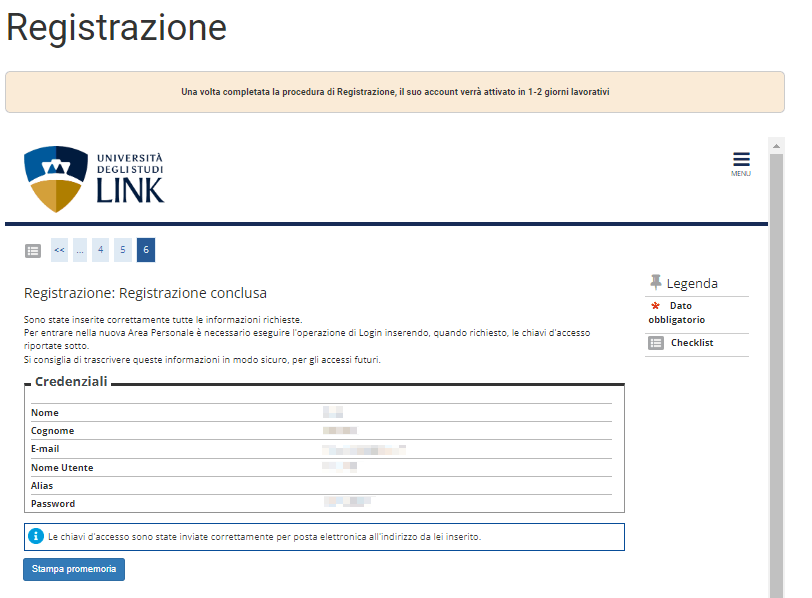
STEP 8 - Return to the Home of the portal and click on the "Access" button on the top right.
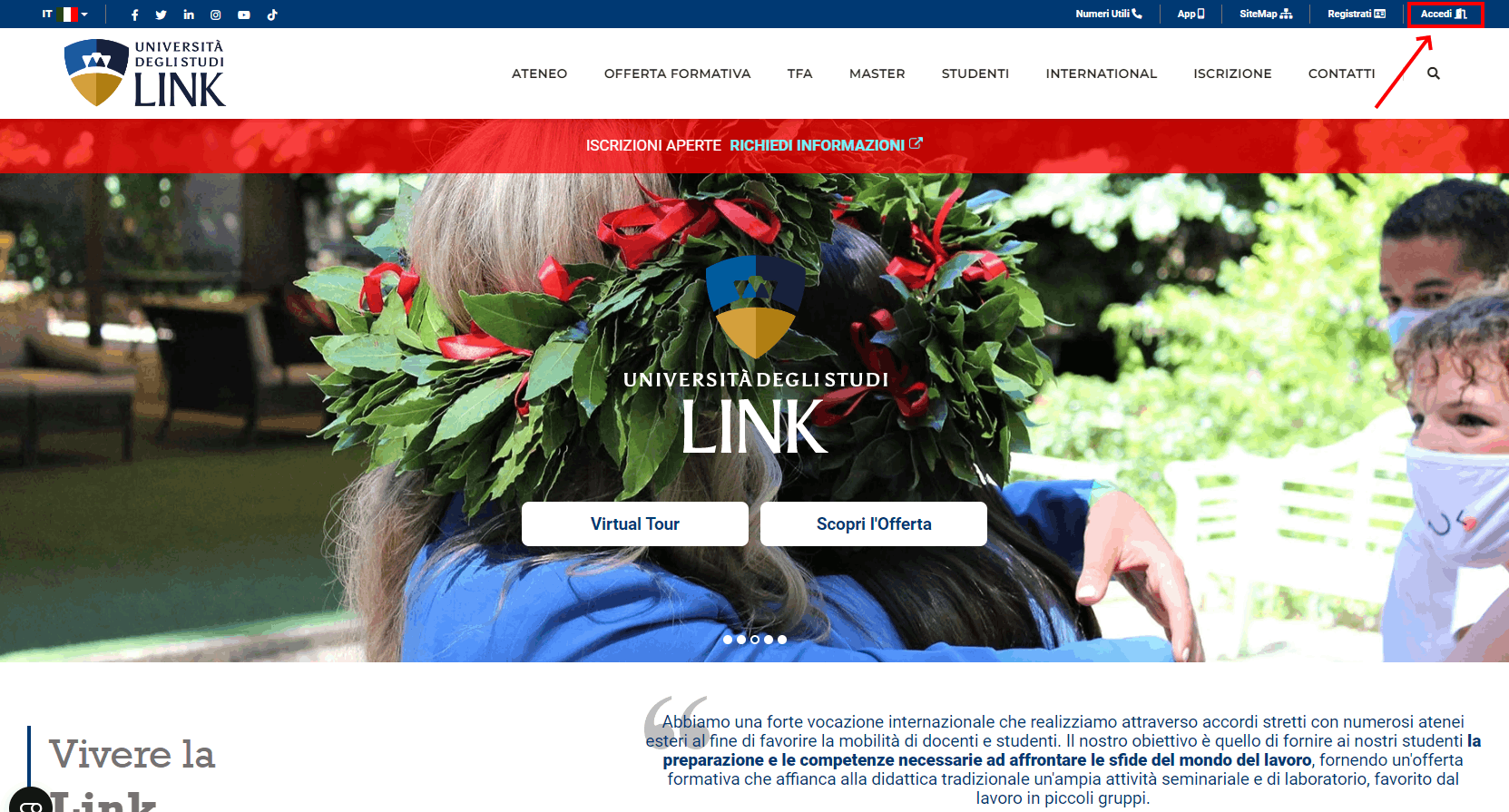
STEP 9 - In the following screen click on the "Change Password" button.
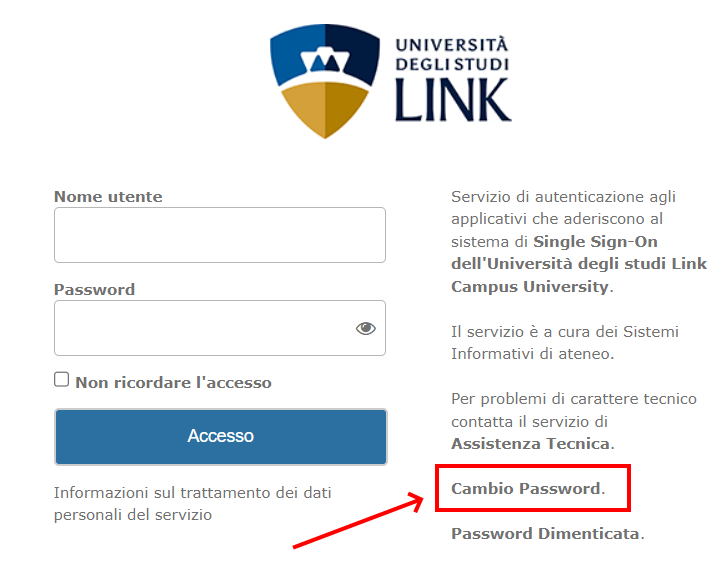
STEP 10 - Enter the previously provided credentials and create a new password. Then click on the "Modify" button.
SECOND PHASE: REGISTRATION FOR THE ADMISSION TEST
![]() Guidelines - procedure of registration to the admission test - Healthcare Professions
Guidelines - procedure of registration to the admission test - Healthcare Professions
STEP 1 - Now you can login to the reserved area (ACCESS TO THE RESERVED AREA).
STEP 2 - Enter the access credentials with the newly changed password.
STEP 3 - Click on the the side menu item "Access to the admission procedure to the Degree Courses"».
STEP 4 - Click on the "Login" button.
STEP 5 - Click on the "MENU" icon at the top right.
STEP 6 - Click on the "Student Administration Office" button and then on "Admission Test" and follow the video instructions.
FOLLOW THE INSTRUCTIONS PROVIDED TO COMPLETE THE PROCEDURE.
